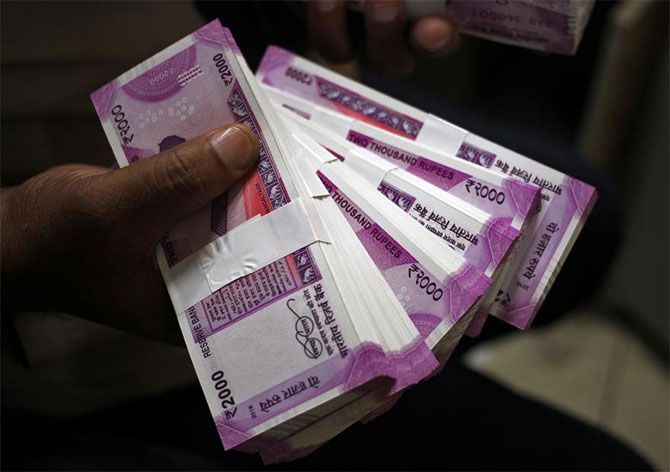Fresh investments by corporates up just 5.8% in FY17, lowest since 1992

Fresh investments by the corporate sector hit a new low in fiscal year (FY) 2016-17.
The combined capital expenditure (capex) by the country’s top 1,000 non-financial firms, in terms of revenue, was up just 5.8 per cent in FY17, growing at the slowest pace since 1992.
The previous low of capex growth was in FY1999-00, after the dotcom bubble in Year 2000.
In all these, the top 1,000 companies made fresh investments of Rs 2.07 lakh crore in the last fiscal year, down from Rs 2.9 lakh crore in FY16, and an all-time high of Rs 5.7 lakh crore in FY14.
An analysis of a common sample of listed companies suggests the investment drought is being led by domestic private sector companies, in complete contrast to their behaviour in the past.
The combined capex by listed Indian private sector companies grew at a record low of 5 per cent in FY17, against 9.4 per cent, and 5.3 per cent growth in capex reported by listed central public sector enterprises (CPSEs) and Indian subsidiaries of global multinationals (MNCs).
This is the slowest growth in capex by the private sector companies in the last 12 years.
Analysts attribute this decline to a poor demand in the economy and reluctance by banks to lend to new projects.
“It’s in line with a near-collapse in banks’ credit growth in the last fiscal year. Public sector banks have put a virtual freeze on fresh lending to risky projects, fearing bad loans hitting funding for large industrial projects,” says G Chokkalingam, founder & managing director, Equinomics Research & Advisory.
The incremental capex by listed private sector companies nearly halved to around Rs 1.1 lakh crore in the last fiscal year, against Rs 2.15 lakh crore a year ago.
The amount is the lowest in 10 years and a third of record high reached in FY12.
In contrast, private sector companies have accounted for 80 per cent of all incremental capex by listed non-financial and non-oil public sector undertakings (PSUs) in the past decade.
In absolute terms, private sector companies have cumulatively invested around Rs 26 lakh crore in fixed assets (net of accumulated depreciation) in the past decade, against Rs 32 lakh crore invested by all listed companies during the period.
The analysis is based on the annual finances of a common sample of 728 companies that are part of BSE 500, BSE MidCap and BSE SmallCap index.
The sample excludes banks and financials, and public sector energy companies such as Oil and Natural Gas Corporation, IndianOil and Hindustan Petroleum.
FY17 figures were taken based on unaudited financials, which may not include subsidiaries’ data of some companies, while capex refers to annual incremental growth in fixed assets defined as gross block minus accumulated depreciation plus capital work in progress.
CPSEs seem to have been least impacted by the slowdown, while MNCs reported an uptick in capex growth, though their investments are too small to move the needle.
The capex growth by private sector companies was down 320 basis points (bps) on a year-on-year (YoY) basis, against a 90-bps decline in capex growth by CPSEs on a YoY basis.
One basis point is one-hundredth of a per cent. Some examples of private sector companies include Tata Motors, Mahindra & Mahindra, Reliance Industries, ITC, Grasim Industries, Hindalco, UltraTech Cement, Hero MotoCorp, among others.
The capex growth in the public sector was largely led by NTPC, Power Grid Corporation, Coal India, Bharat Electronics and Container Corporation.
Excluding these five companies, fresh investment by other PSUs was up only 4 per cent last fiscal on a YoY basis.
Private sector companies, however, still accounted for two-third of all capex by all listed companies last fiscal year, pulling down the growth for the entire universe.
CPSEs and listed MNCs accounted for 32 per cent and 3 per cent, respectively, of incremental capex last fiscal year.
The combined capex of all listed companies - excluding banks and financials and oil PSUs - grew by 6.2 per cent in FY17, growing at the slowest pace in over a decade.
In absolute terms, incremental investment in fixed assets declined to Rs 1.71 lakh crore in FY17, against Rs 2.77 lakh crore in FY16. The amount was the lowest since FY07.
Economists say that the data corroborates the trend of a steady decline in the share of investments in the country’s gross domestic product (GDP).
“If you look at the expenditure side of GDP, investment growth is now down to single digits.
Whatever investment growth is happening is largely due to incremental spending by state and central governments,” says Devendra Pant, chief economist and head-public finance, India Ratings.
Others flag the issue of falling return on existing investments.
“There is little economic incentive for companies to make fresh investment when return on existing assets is less than the risk-free return or that of bank deposits,” says Dhananjay Sinha, head-research, economist and strategist at Emkay Global Financial Services.
The return on assets for the private sector companies declined to 5.1 per cent in FY17, down 2 bps on a YoY basis.
It used to be around 12 per cent prior to the 2008 capex boom.
In comparison, the yield on the 10-year government bond is around 6.5 per cent, while a State Bank of India five-year fixed deposit earns around 8.5 per cent.
Experts don’t foresee any meaningful turnaround in the corporate capex cycle in the near-term, given poor return on existing investments and tepid demand growth across sectors.
“India now faces a structural problem, with lack of demand depressing returns across sectors. Exports are not helping, with flat- to low-single digit growth in software and pharmaceutical exports.
The only way out is a large fiscal stimulus, which looks difficult, given financial commitments towards entitlement programmes such as farm loan waivers,” says Sinha.
Photograph: Mukesh Gupta/Reuters












 © 2025
© 2025